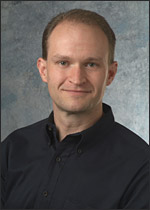Case Western Reserve research team from new Human Fusions institute aims for $10 million Avatar XPrize competition; winner will best ‘transport a human’s sense, actions and presence’ to another place
In 15 years at Case Western Reserve University, Dustin Tyler has been on a mission to extend physical touch—the “essence of the human experience”—across space and time.
That drive has led to groundbreaking research and methods of harnessing robotic limbs to the body’s nervous system to provide vastly improved function and sensation for amputees.
Most notably, Tyler and his team in recent years successfully brought the sensation of physical touch to a prosthesis so an amputee could safely pick up his granddaughter and effectively slice a tomato—fundamentally changing the prosthesis from a sporadically used tool to a working “hand.”

Now Tyler, the Kent H. Smith II Professor of Biomedical Engineering in the Case School of Engineering, has formed the Human Fusions Institute, an endeavor to broaden the reach of that technology—an effort to achieve what he calls “neural reality.”
Tyler said he believes the institute will be an international leader in pioneering this new technology and emerging idea. The institute is supported in part by grants and a portion of a $20 million strategic initiative fund for biomedical engineering that late alumnus Robert Aiken and his wife, Brenda, committed in 2017.
Researchers across the globe are on the cusp of “enabling the human mind to transcend the barriers of the body” via neural interfaces, Tyler said. In other words, allowing a person in one location to experience the sensation of holding hands, for example, with another person anywhere in the world.
“There has, for 40 years since the technology was pioneered here in Cleveland, been a focus on using this technology for medical and rehab,” Tyler said. “But over last two-and-a-half years, the idea has broadened beyond not just ‘tech for fixing broken people, but toward changing the relationship between humans and machines. That’s where we’re headed with this institute.”
$10 million ‘Avatar XPrize’
Among the next steps in getting there: Taking a shot at winning a portion of a $10 million prize being dangled by the XPrize Foundation, the same organization behind the 2004 private space-race competition that awarded $10 million to make the first privately funded human spaceflight.
This new Avatar XPrize, a contest announced in 2018 at the South By Southwest conference in Austin, Texas, and sponsored by Japan’s All Nippon Airways, is a “global competition focused on the development of an “Avatar System that will transport a human’s sense, actions and presence to a remote location in real time, leading to a more connected world,” according to its website.
An avatar is essentially a robot that can function as the embodiment of a human being and “in the future, avatar applications could help provide healthcare services and deploy immediate emergency response in natural disaster scenarios,” according to XPrize site.
The nonprofit foundation on in January released a list of 77 finalists from 19 countries who will compete for $10 million in prizes to be announced in March 2022. Tyler’s Human Fusions Institute at Case Western Reserve is among the finalists.
For Tyler, the XPrize chase only part of what he believes the institute can accomplish.
“The Avatar competition isn’t the end point for us, but it is the embodiment of what we’re trying to do,” he said. “That is, to think about and develop the symbiotic relationship between the machine and the human.”
That relationship has been fundamentally unchanged for millenia, Tyler said, citing, as an example, how man’s use of tools has evolved over the last 100,000 years to reflect technology’s influence.
“The beauty of this is that now I can put a prosthesis anywhere in the world, and via this ‘neural reality’ you can have the same sensation for any distance, from anywhere,” he said. “This means that our previous barriers have mutated and we can have a shared human experience at an entirely new level.”
For more information, contact Mike Scott at mike.scott@case.edu
